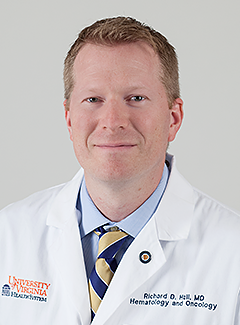Which cancer do you think kills the most women? Chances are, you guessed breast cancer. Incorrect! Believe it or not, lung cancer is the leading cause of cancer death among women. In a recent study by the American Lung Association to measure awareness of lung cancer risk, only 1 percent of women surveyed selected lung, compared to 87 percent who selected breast.
Lung cancer surpasses pancreatic, ovarian and other types of aggressive cancer as the leading cause of cancer deaths in both women and men. Although smoking is a major risk factor of the disease, approximately 20 percent of patients diagnosed with lung cancer have never smoked. Of this 20 percent, most are women.

“When looking at lung cancer across the board in the United States, the number of patients who are diagnosed with the disease is almost the same in both men and women. However, when I look at my practice and consider patients who were never smokers, almost all of my patients happen to be female,” says UVA medical oncologist Richard Hall, MD.
The Myth of the Smoker’s Disease
Hall adds that in other parts of the world, the majority of women who develop lung cancer never smoked. That’s especially true in East Asian countries such as:
- Japan
- South Korea
- China
- Taiwan
Lung Cancer: The Leading Cause of Cancer Deaths
Because the incidence of lung cancer in non-smoking women is higher than in non-smoking men, organizations such as the American Lung Association (ALA) are trying to raise women’s awareness of the disease. The ALA surveyed 1,000 women to measure awareness, knowledge and perceptions about lung cancer and found:
- Only 1 percent selected lung cancer as a leading cause of cancer death among women, compared to 87 percent who selected breast cancer.
- Only 1 in 5 women knew that less than half of all women diagnosed with lung cancer would live a full year after diagnosis.
Lung cancer has one of the lowest 5-year survival rates of all cancers, with only 18 percent of patients surviving at least 5 years, as reported by the ALA.
According to Hall, women who have never picked up a cigarette are shocked upon diagnosis of lung cancer. “Naturally it raises questions of other environmental exposures that contribute to their diagnosis, and unfortunately, there is still a lot we don’t yet understand.”
The first step to improving the statistics surrounding lung cancer is educating the public about the disease. Although we have a lot to learn about what causes lung cancer, there are critical steps you can take to prevent the disease: Quit smoking and get screened.

“Smoking cessation is the single most important thing someone can do to reduce their risk of developing lung cancer. It also helps them save money. Screening is the second most important action to take, especially for patients with a history of smoking,” says Hall.
Earlier this month, the Centers for Medicare and Medicaid Services (CMS) approved CT screening for patients who qualify based on age and smoking history. The United States Preventative Services Task Force recommended the CMS approve lung screening after the results of the National Lung Screening Trial showed that people who underwent CT chest screening lived longer than those who underwent annual chest x-rays.
Treating Lung Cancer
Without screening, lung cancer is generally diagnosed at later stages, making it more difficult to treat.
However, certain lung cancers can be treated by targeting the genetic changes in lung tumors, stopping the growth and survival signals of cancer cells at the molecular level.
While UVA provides these treatments, Hall and his team are also conducting clinical trials to identify additional therapies for patients at all stages of disease.
If you…
- Are concerned about lung cancer symptoms
- Are high risk (PDF) and would like to be screened
- Want a consultation with the lung cancer team at the UVA Cancer Center
Call 434.924.4246 to make an appointment.